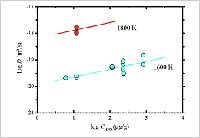Enlarge Image
Earth science: Small effect of water on upper mantle rheology inferred from silicon self-diffusion in forsterite
Deformation experiments show that water has a great influence on the reduction of the viscosity of olivine—the most abundant mineral in the upper mantle.
However, the conditions of the deformation experiments are significantly different from those at the interior of the Earth. For example, the strain rate and stress in experiments are much higher than those in the mantle and the range of water content is limited in the deformation experiments.
Now, Hongzhan Fei and Tomoo Katsura at University Bayreuth, Michael Wiedenbeck at Helmholtz Centre Potsdam, and Daisuke Yamazaki at Okayama University report on the small and limited effect of water on the viscosity of olivine.
To estimate the variation of viscosity with water content the researchers determined the silicon self-diffusion coefficient of olivine (forsterite) as a function of water content ranging from <1 to 800 wt. ppm by means of high pressure experiments at 8 GP and 1600 K to 1800 K. This appraoch was used because silicon self-diffusion is the rate limiting process for deformation of olivine at high temperature as in the Earth's mantle.
The dependency of water content were determined to be D=CH2O1/3, where D and CH2O are the silicon diffusivity and water content, respectively.
These experimental results indicate that the low viscosity zone in the asthenosphere cannot be explained by the mineral hydration.
Reference:
・ Authors: Hongzhan Fei, Michael Wiedenbeck, Daisuke Yamazaki, Tomoo Katsura
・ Title of original paper: Small effect of water on upper-mantle rheology based on silicon self-diffusion coefficients.
・ Journal, volume, pages and year: Nature 498, 213 (2013).
・ Digital Object Identifier (DOI): 10.1038/nature12193
・ Affiliations: University Bayreuth, Helmholtz Centre Potsdam, Okayama University

